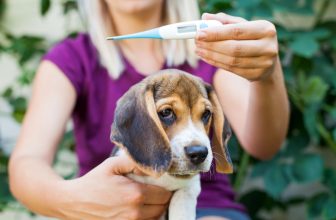
When a dog is experiencing a seizure, he is not himself, says Dr. Jon Nauss, medical director at Irvine Valley Veterinary Hospital Primary Care & Integrative Medicine, and it can be very alarming to see your beloved pet experience something like this.
Dog seizure symptoms: generalized and focal
What does it look like when a dog is having a seizure? Seizures are typically categorized as generalized or focal.
“A generalized seizure is what most people think of when they think of seizures,” says Dr. Nauss, and describes them as ranging from mild to severe.
Generalized seizures include symptoms like:
- sudden and uncontrolled movements
- vocalization
- loss of bowel and/or bladder control
- potential loss of consciousness
Focal seizures in dogs are easier to overlook. “Some pets experience focal seizures without their owners even realizing it,” explains Dr. Nauss. “These are usually an abnormal movement of the limbs or a twitching, usually around the head and face.”
What to do when a dog has a seizure
If your dog is having a seizure, follow these steps:
- Be calm, steady and gentle. “Use extreme care around your dog’s face to ensure you don’t inadvertently get bitten,” Dr. Nauss says.
- Clear the area around your dog. Ensure there is nothing in the pet’s immediate vicinity that may hurt him such as stairs he could fall down, or something close by that could fall on him. And move other pets (and any small children) to a different area in the home.
- Record important information. “If possible, try to film the event on your phone,” suggests Dr. Nauss. “Apart from indicating how long the event lasted, it will provide valuable insights for your veterinarian.”
If it wasn’t possible to record the dog’s seizures, write notes recording as many details as possible:
-
- Approximately how long the episode lasted
- Whether your pet lost bladder control
- Whether your pet lost bowel control
- What was going on before the seizure started
What to do after a dog has a seizure
Dogs experience “a postictal phase after seizures where they remain disoriented and may seem blind for a while,” explains Dr. Nauss
After a seizure, create a calm, quiet and safe environment. Turn off the television and music, dim the lights, and make sure your dog is in a safe space.
Can you stop a dog from having a seizure?
No, there isn’t a way to stop a dog from having a seizure, but research shows that CBD may help reduce the frequency of seizures in dogs.
Last year, in an ElleVet Sciences clinical trial, 40 percent of dogs in the study saw a reduction in frequency of seizures after receiving CBD treatment. And in 2019, scientists at the University of Colorado found that 89 percent of dogs who received CBD in the clinical trial had a reduction in the frequency of seizures.
“It’s crucial to have an in-depth discussion with your veterinarian to ensure your pet avoids taking other medications that may lower the seizure threshold, making it easier for a pet to have a seizure. There are adjunctive treatments like taking fatty acid supplements and acupuncture that may help control seizures,” adds Dr. Nauss.
There is a specialized technique called ocular compression that can be taught to a pet owner if he sees a seizure coming on. This is something to be discussed in detail with your veterinarian.
For dogs with epilepsy, ensure he takes any prescribed medications on a regular schedule.
<
Credit Source link







